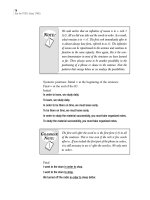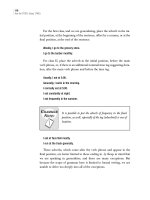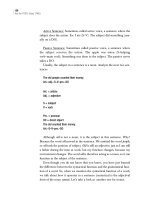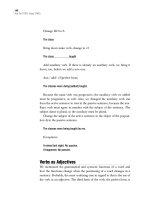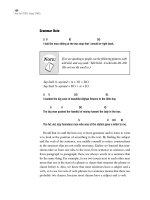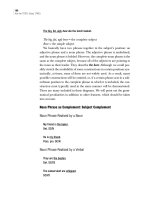Ace the toefl essay part 12
Bạn đang xem bản rút gọn của tài liệu. Xem và tải ngay bản đầy đủ của tài liệu tại đây (159.66 KB, 10 trang )
100
Ace the TOEFL Essay (TWE)
14. She (walk) walked yesterday, but I had gone (go) before then.
15. If he is (go) going to the post office later, give (give) him this letter,
please. Present progressive for the future + command form (always
v1).
16. Because they had (break up) broken up their companies, the competi-
tors got (get) most of the profits. Past perfect (v3) + simple past (v2)
17. What I (want) wanted to see was the success of all of the students.
18. Although I had not (see) seen him, I knew (know) then that he was
in town.
19. Because they were (go) going so slowly, the meteor overtook (over-
take) them in a matter of seconds. Past progressive + simple past.
20. After you had (give) given me the green light, I (send) sent your let-
ter to the boss. Remember: Past perfect before simple past.
21. What bothers me is that as you are (get up) getting up, I will be (go)
going to bed. Two actions are happening at exactly the same time
for a duration in the future.
As indicates duration.
22. Not knowing the truth is what had (give) given me the problem
before you finally (tell) told me. Past perfect is prior to simple past.
23. I had lent (lend) him money far in advance.
In advance suggests the
simple past, and prior to that must be past perfect.
24. Too much responsibility always (cause) causes problems with irre-
sponsible tenants.
Always indicates repeated action; therefore, sim-
ple present is mandatory.
25. Since you will be (arrive) arriving early, could I (impose) impose
on you for a ride? Future progressive to indicate simple future +
modal +v1.
Answers to Exercise 4.3
Directions: Write C for copula verb or A for action verb. 1.3
1. He sounded the bell loudly due to the impending storm. A
2. He looked tired after being on the road for two days. C
3. As we walked through the pyramids, a rainbow appeared over the
horizon. A
4. It seemed as if we were lost. C
5. He reacted calmly. A
6. We remained calm through the night. A/C
TOEFL Internals flowed 7/13/07 3:36 PM Page 100
101
Parts of Speech
7. Something smelled fishy about his late-night meetings. C
8. He smelled badly, because his nose was broken. C
9. I felt bad about having her dog put outside. C
10. He appears to know what he is doing. C
11. The paper felt rough. C
12. He looked about the room furtively. A
13. He acted tough. A/C
14. He acted very obnoxiously at dinner. A
15. We wanted to ensure that the room did not smell bad. C
16. He was acting like a security guard. A/C
17. They remained in the ambulance. A
18. The excuse sounded like a lie. C
Answers to Exercise 4.4
Directions: Choose the appropriate answer.
1. The little boy is late. He _____get home before his mother becomes
angry. (ought to, had better
, can, must)
2. I really _____start exercising more, because I want to look good for
my reunion. (must, should
, could, would)
3. _____I actually register my car? (must
, should, can, had better)
4. _____you let me borrow your pen? (should, could
, may)
5. The boy said, “Do I _____wear this tie?” (need, must, have to
, bet-
ter)
6. You_____have the doctor check you over every year. (must, should
,
need, might)
7. Everyone _____eat a balanced diet, although most do not. (must,
shall, might, ought to
, may)
8. I_____go to the movie if I had enough money. (can, should, will,
would
)
9. _____a teacher allow the students to cheat on a test? (can, could,
should
, must)
10. The man thought he _____(could, would
, will, can) have fame and
glory if he _____(shall, will, would, could,
might) only get to the top
of the mountain.
TOEFL Internals flowed 7/13/07 3:36 PM Page 101
102
Ace the TOEFL Essay (TWE)
Adjectives
Adjectives describe or modify nouns. These usually come before the
noun, but not always.
The happy
boy got a toy.
The big
man said hello.
I am a good
teacher.
I saw the old
tree.
These are the easy adjectives, as most are. Notice that each adjective is
placed before the noun it describes. However, we will see later that some
adjectives are put off or delayed until after the nouns they describe. We
are usually taught at a very young age that we can add a suffix to adjec-
tives to compare that noun to something else.
The boy is
happier than the man.
The
bigger man said hello.
See appendices for comparatives and superlatives.
Note that there are irregular adjectives just as there are irregular verbs.
We will discuss these in more detail in a later chapter. I mentioned that
we delay some modifiers (adjectives). These are postposed adjectives
(adjectives that are positioned after [post] the thing described).
I am loath to run a mile.
The adjective is loath, and it modifies the subject I. Am is the be verb.
In addition, we can use the perfect form of some verbs to function as a
modifier. The word itself is not actually an adjective. However, it
describes, or modifies, so we can say that it acts like an adjective. We call
this an adjective. Look over the following sentences.
1. The written word is a powerful weapon.
THE
:
RE
N
OTE
:
TOEFL Internals flowed 7/13/07 3:36 PM Page 102
103
Parts of Speech
2. The work is completed.
3. The boy is tir
ed.
4. The une
xercised muscle loses its strength.
5. The boiling
water is very hot.
Explanation
1. Written is the adjective. By examining the word, we know that write
is the verb, and written is the perfect form (third form).
2.
Complete is the verb. This is a regular verb, which may or may not
make it difficult to recognize the part of speech that it is in the sen-
tence. However, if we look at the verb
is, we know that is means
present tense, and simple past and present tense may not go togeth-
er at the same time. Therefore,
completed must be an adjective in this
sentence.
3.
Tired is the adjective, with the same explanation as number 2. We
know the word
tired so well that we rarely think of the verb tire.
4.
Unexercised is the adjective. Exercise is a noun and a verb. Here, we
use it to describe the word
muscle.
5.
Boiling is the adjective. It describes water, which is a noun.
These words are known as participles. They are forms of words,
such as
boiling, that do not function in their normal capacity. Boiling is a
present participle in the following sentence: Boiling lava from the volcano
destroyed the town.
There is also the past participle: The
tr
aveled
man has many experi-
ences. These words in italics are usually verbs. In this context, they func-
tion as adjectives.
Many times, I give the example of myself. I am a father, but when I go
to work, I take on a different role as a professor. The same is true with the
English language. These words are verbs in other contexts, but they
assume a different function in these particular sentences. When we start
to look at a language in this way, we start to understand it. Then, we
improve and become successful. These types of approaches are employed
throughout the text. It only gets easier.
TOEFL Internals flowed 7/13/07 3:36 PM Page 103
104
Ace the TOEFL Essay (TWE)
Verbs as Adjectives:
Past Participle
Regular verbs take -ed:
The boiled water was hot.
The endanger
ed bull charged.
The embitter
ed debate turned violent.
Irregular verbs take -en, -t, and some change in the middle to u:
The broken warrior was returned to his camp.
The written
word is powerful.
The word spok
en was like dynamite.
The promise k
ept is like money in the bank.
The swept
floor looked very impressive.
The song sung
is the best kind.
The run
race is the best kind, too.
Present Participle
The fighting dogs were apprehended.
The leader was astonishing
.
The astounding
news caught me off guard.
These participles can be confusing if you have a simple con-
struction of S–helping verb–MV (present participle). Ex:
He is confusing; it is astonishing.
THE
:
RE
N
OTE
:
TOEFL Internals flowed 7/13/07 3:36 PM Page 104
